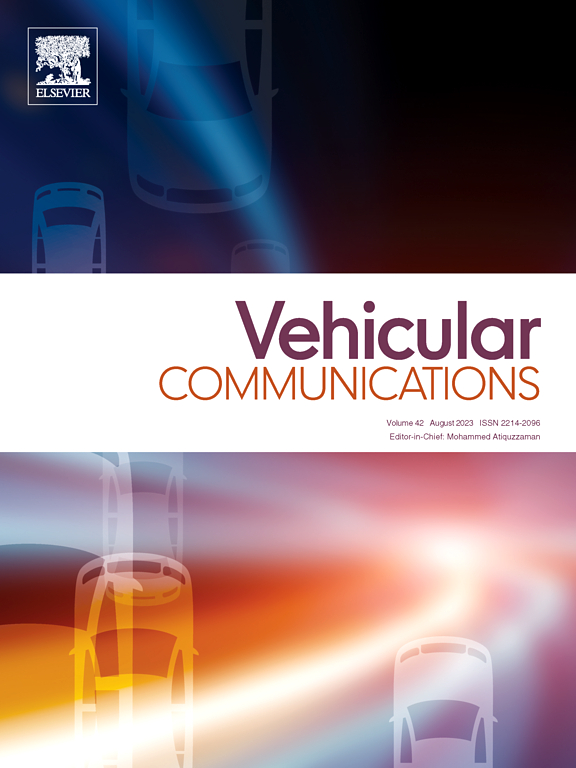A data sharing scheme based on blockchain for privacy protection certification of Internet of Vehicles
IF 6.5
2区 计算机科学
Q1 TELECOMMUNICATIONS
引用次数: 0
Abstract
With the vigorous development of Internet of Vehicles (IoV) technology, modern cars equipped with advanced on-board systems are continuously generating massive amounts of data. Utilizing this data can improve driving safety and achieve better service quality in smart transportation systems. Therefore, ensuring the efficiency and security of data sharing is an important issue. Integrating IoV and blockchain technology can provide solutions to the data sharing security problems. This paper researches on IoV data sharing based on blockchain technology. In view of the problem that Internet of Vehicles data is susceptible to denial of service attacks, central failures and privacy leaks, we propose a data sharing scheme based on blockchain for privacy protection certification of Internet of Vehicles. Firstly, a decentralized privacy protection authentication framework is proposed is based on blockchain. Authenticated communication is performed between vehicle nodes and roadside units (as trusted authorities) by using authentication and access authentication schemes. Secondly, the trusted cluster head selected through the weight indicator is responsible for forwarding the information to the Trust Authority (TA), which then forwards the data to cloud storage and records the certificate and hash value on the distributed blockchain, along with other related information. In addition, the solution also uses a practical Byzantine fault-tolerant consensus algorithm to ensure the security and reliability of the blockchain, as well as the efficiency and decentralization of cloud storage. Finally, the TA revokes the certificate of the malicious vehicle node and clears it from the blockchain. Security analysis experiments show that our solution can effectively resist various threats such as counterfeiting, replay attacks, forgery and data tampering, thereby ensuring the security of Internet of Vehicles data sharing. Compared to the proposed solution, our performance has improved by 50.12%, 41.62%, 6.01%, and 29.11%, respectively.
基于区块链的车联网隐私保护认证数据共享方案
随着车联网(IoV)技术的蓬勃发展,配备先进车载系统的现代汽车不断产生大量数据。利用这些数据可以提高驾驶安全性,并在智能交通系统中实现更好的服务质量。因此,确保数据共享的效率和安全性是一个重要的问题。将车联网与区块链技术相结合,可以为数据共享安全问题提供解决方案。本文研究了基于区块链技术的车联网数据共享。针对车联网数据容易受到拒绝服务攻击、中心故障、隐私泄露等问题,提出了一种基于区块链的车联网隐私保护认证数据共享方案。首先,提出了一个基于区块链的去中心化隐私保护认证框架。通过使用身份验证和访问身份验证方案,在车辆节点和路边单元(作为受信任的权威)之间执行身份验证通信。其次,通过权重指标选择的可信簇头负责将信息转发给信任机构TA (Trust Authority), TA将数据转发到云存储,并在分布式区块链上记录证书和哈希值以及其他相关信息。此外,该方案还采用了实用的拜占庭容错共识算法,既保证了区块链的安全可靠,又保证了云存储的高效和去中心化。最后,TA撤销恶意车辆节点的证书,并将其从区块链中清除。安全分析实验表明,我们的解决方案能够有效抵御伪造、重放攻击、伪造、数据篡改等各种威胁,从而保障车联网数据共享的安全。与提出的解决方案相比,我们的性能分别提高了50.12%,41.62%,6.01%和29.11%。
本文章由计算机程序翻译,如有差异,请以英文原文为准。
求助全文
约1分钟内获得全文
求助全文
来源期刊

Vehicular Communications
Engineering-Electrical and Electronic Engineering
CiteScore
12.70
自引率
10.40%
发文量
88
审稿时长
62 days
期刊介绍:
Vehicular communications is a growing area of communications between vehicles and including roadside communication infrastructure. Advances in wireless communications are making possible sharing of information through real time communications between vehicles and infrastructure. This has led to applications to increase safety of vehicles and communication between passengers and the Internet. Standardization efforts on vehicular communication are also underway to make vehicular transportation safer, greener and easier.
The aim of the journal is to publish high quality peer–reviewed papers in the area of vehicular communications. The scope encompasses all types of communications involving vehicles, including vehicle–to–vehicle and vehicle–to–infrastructure. The scope includes (but not limited to) the following topics related to vehicular communications:
Vehicle to vehicle and vehicle to infrastructure communications
Channel modelling, modulating and coding
Congestion Control and scalability issues
Protocol design, testing and verification
Routing in vehicular networks
Security issues and countermeasures
Deployment and field testing
Reducing energy consumption and enhancing safety of vehicles
Wireless in–car networks
Data collection and dissemination methods
Mobility and handover issues
Safety and driver assistance applications
UAV
Underwater communications
Autonomous cooperative driving
Social networks
Internet of vehicles
Standardization of protocols.
 求助内容:
求助内容: 应助结果提醒方式:
应助结果提醒方式:


